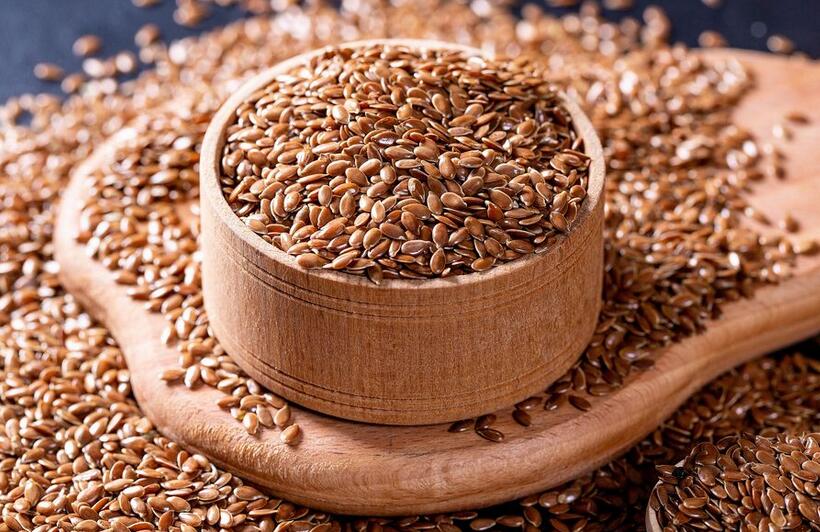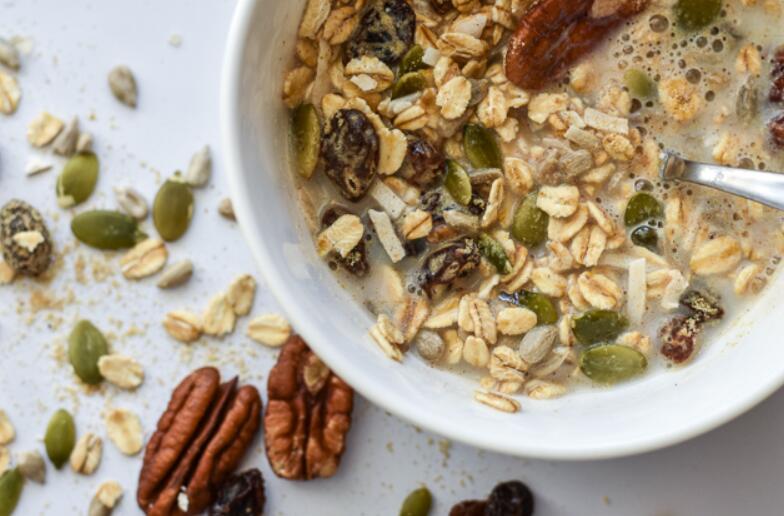Flaxseeds, also known as linseeds, are a tiny yet mighty superfood used in traditional cuisines for centuries. These small, brown, or golden seeds pack a powerful punch of nutrients that can help fight against numerous diseases and promote overall health. In this article, we will explore the 20 amazing health benefits of flaxseeds and how to incorporate flaxseeds into your diet.
What are Flaxseeds?
Flaxseeds are tiny, golden, or brown-colored seeds that come from the flax plant. They have been used for centuries in traditional cuisines of Asia, America, and Africa. They can be eaten raw but are more beneficial when sprouted or ground into a tasty meal. The body can absorb the nutrients from flaxseeds more easily when it is ground or sprouted. Flaxseeds can also be used to make flaxseed oil, which is also very easy to digest.
Chia Seeds vs. Flax Seeds
Chia seeds and flax seeds are two nutrient-dense seeds that have become increasingly popular in recent years. Here’s a comparison of chia seeds and flaxseeds:
1. Nutrient Profile: Both chia and flaxseeds are great sources of protein, fiber, healthy fats (omega-3 fatty acids), vitamins, and minerals. However, chia seeds contain slightly more calcium, iron, magnesium than flaxseeds.
2. Digestibility: Chia seeds have a gelatinous coating that allows them to absorb water easily which makes them easy to digest even when consumed raw.
3. Shelf life/storage: Chia Seeds have a longer shelf life compared to Flax Seeds due to their higher antioxidant content ensuring they stay fresher longer
4. Usage in Recipes: Chia seeds can be mixed into smoothies or yogurt bowls; used as an egg substitute while baking; made into pudding; or sprinkled on oatmeal or salads. Flaxseed meal can be added to baked goods like muffins and breads but must be cooked otherwise, they will spoil quickly & start giving off a rancid smell
5. Cost-wise – generally, both are priced similarly with slight variances – considered a relatively affordable addition for adding extra nutrition to your meals.
Both chia and flaxseeds offer unique benefits, making them wonderful additions to any balanced diet—the winner depends on personal preferences & dietary restrictions. They work well together too! If you’re looking for all-around high nutrition value without having to grind, then go for Chai-seed, but if grinding doesn’t bother you, it still offers a good amount of Omega-3 essential fatty acid plus fiber, then choose Flax seed Meal.

Nutritional Value of Flax Seeds
Here are some of the critical nutritional components of flax seeds:
- Fiber: Flax seeds are an excellent source of soluble and insoluble fiber. A 1-ounce (28-gram) serving of flax seeds contains 7.7 grams of fiber, about 27% of the recommended daily intake.
- Protein: Flax seeds are a plant-based source of protein. A 1-ounce (28-gram) serving of flax seeds contains 5.2 grams of protein.
- Healthy fats: Flax seeds are a good source of healthy fats, particularly alpha-linolenic acid (ALA), an omega-3 fatty acid. A 1-ounce (28-gram) serving of flax seeds contains 6.4 grams of fat, including 1.6 grams of saturated fat, 1.8 grams of monounsaturated fat, and 3 grams of polyunsaturated fat.
- Minerals: Flax seeds are a good source of minerals, including magnesium, phosphorus, and copper. A 1-ounce (28-gram) serving of flax seeds contains 79 milligrams of magnesium, 162 milligrams of phosphorus, and 0.2 milligrams of copper.
- Vitamins: Flax seeds are a good source of several vitamins, including thiamin, niacin, and vitamin B6. A 1-ounce (28-gram) serving of flax seeds contains 0.2 milligrams of thiamin, 0.3 milligrams of niacin, and 0.1 milligrams of vitamin B6.
20 Amazing Health Benefits of Flax Seeds
Here are 20 amazing health benefits of consuming flax seeds:
1. Rich in vitamins
Flax seeds are a good source of several vitamins, including vitamin B1 (thiamin), vitamin B6, folate, vitamin E, and vitamin K. Vitamin B1 is important for converting food into energy and maintaining proper nerve function.
Vitamin B6 is involved in numerous biochemical processes, including the metabolism of amino acids and the production of neurotransmitters.
Folate is essential for the production of DNA and healthy cell growth. Vitamin E is an antioxidant that helps protect cells from damage. Vitamin K plays a critical role in blood clotting and bone health.
2. Flax Seeds Are High in Omega-3 Fats
Flax seeds are considered a rich source of omega-3 fatty acids, particularly alpha-linolenic acid (ALA), a type of polyunsaturated fat that the body cannot produce on its own.
Omega-3 fats are essential for maintaining good health, and they are known to have numerous benefits, such as reducing inflammation, improving brain function, and lowering the risk of heart disease.
Incorporating flax seeds into your diet is an excellent way to increase your intake of omega-3 fats, especially if you don’t consume fish, which is another good source of these healthy fats.
3. Flax Seeds Are a Rich Source of Lignans
Flax seeds are a rich source of lignans, which are a type of plant compound that has estrogenic properties. These compounds are known for their potential health benefits, including reducing the risk of breast cancer and improving heart health.
Lignans in flax seeds are also thought to have anti-inflammatory and antioxidant properties. Additionally, flax seeds contain up to 800 times more lignans than other plant foods. The lignans in flax seeds are thought to act as phytoestrogens, which means they can mimic the effects of estrogen in the body.
4. Flax Seeds Are Rich in Dietary Fiber
Flax seeds are rich in dietary fiber, including both soluble and insoluble fiber. Soluble fiber helps to regulate blood sugar and cholesterol levels, while insoluble fiber promotes healthy digestion and regularity.
Just one tablespoon of flax seeds provides approximately 2 grams of fiber, about 8% of the recommended daily intake. Including flax seeds in your diet can be a simple and effective way to increase your fiber intake and improve your overall health.

5. Promotes heart health
Flax seeds are effective in promoting heart health. The seeds contain high alpha-linolenic acid (ALA), an omega-3 fatty acid that can reduce the risk of heart disease. ALA helps to lower blood pressure, decrease inflammation, and prevent blood clots, all of which are essential factors in reducing the risk of heart disease.
Additionally, the lignans in flax seeds have been found to have antioxidant properties, which can help prevent plaque buildup in the arteries. This can also contribute to a lower risk of heart disease.
6. Reduces inflammation
Chronic inflammation is a contributing factor in many diseases, including arthritis, heart disease, and cancer. Flaxseed is rich in alpha-linolenic acid (ALA), which is converted by the body into omega-3 fatty acids with potent anti-inflammatory properties. Consuming flaxseed regularly can help reduce inflammation and lower the risk of chronic diseases.
7. Improves Digestive Health
Flaxseed is an excellent source of dietary fiber, which promotes digestive health by preventing constipation and promoting regular bowel movements. In addition, the lignans in flaxseed have been shown to possess prebiotic properties, which can support the growth of beneficial bacteria in the gut.
The soluble fiber in flax seeds can also help slow down food passage through the digestive system. This can help to regulate blood sugar levels and reduce the risk of spikes in insulin.

8. Improves cholesterol levels
The soluble fiber in flaxseeds can help lower LDL (bad) cholesterol levels by binding to cholesterol in the digestive system. Additionally, flaxseeds contain lignans, which have been linked to lower levels of LDL cholesterol and triglycerides. Incorporating flaxseeds into your diet can be a simple way to improve your cholesterol levels and promote heart health.
9. Boosts immune system
Flaxseed contains several essential nutrients for maintaining a healthy immune system, including vitamins B1, B6, and E, magnesium, and zinc. These nutrients work together to support the production of immune cells and help the body fight off infections.
In addition, flax seeds are a rich source of lignans, which have been found to have antioxidant properties. Antioxidants can help to protect cells in the body from damage caused by free radicals.
10. Helps with weight loss
Flaxseed contains high amounts of dietary fiber, making it an excellent addition to any weight management diet. The fiber content in flaxseed helps keep blood sugar levels in check, preventing the intake of excess calories through overeating. This makes it an ideal food for people trying to lose or manage weight.
Additionally, the healthy fats in flax seeds, such as omega-3 fatty acids, can help reduce inflammation and promote satiety. Studies have shown that incorporating flax seeds into a weight-loss diet can significantly reduce body weight and body mass index (BMI).

11. Regulates blood sugar
Flaxseed is a rich source of both soluble and insoluble dietary fiber. This property of flaxseed aids in maintaining normal blood sugar levels in people suffering from diabetes.
The high fiber content in flax seeds can help slow the absorption of sugar in the bloodstream, which can help prevent spikes in blood sugar levels.
Additionally, a study published in the Nutrition Research journal states that daily flaxseed intake improves glycaemic control in obese men and women with pre-diabetes. Flaxseed consumption decreases glucose and insulin and improves insulin sensitivity as part of the habitual diet in obese individuals with pre-diabetes.
12. Improves skin health
Flax seeds are a rich source of omega-3 fatty acids and antioxidants, which can be beneficial for improving skin health. These nutrients’ anti-inflammatory properties can help reduce skin inflammation, redness, and irritation, common symptoms of conditions such as eczema and psoriasis.
In addition, the lignans found in flax seeds have been found to have estrogenic properties, which can help to improve skin elasticity and hydration.

13. Promotes healthy hair
Flax seeds are a rich source of nutrients that can promote healthy hair growth and improve overall hair health. The omega-3 fatty acids in flax seeds are essential for healthy hair growth, as they nourish the hair follicles and promote stronger, shinier hair.
In addition, flax seeds are also a rich source of lignans, which have anti-inflammatory properties that can help to reduce scalp inflammation. The lignans in flax seeds can also help to balance hormones, which can positively impact overall hair health.
14. Reduces hot flashes
Hot flashes are a common symptom experienced by women during menopause. During menopause, estrogen levels decrease can lead to hot flashes. The phytoestrogens in flax seeds can help to balance hormone levels and reduce the severity of hot flashes.
In a study of postmenopausal women, those who consumed 40 grams of ground flax seeds per day for six weeks experienced a significant reduction in the frequency and intensity of hot flashes compared to the control group. Another study found that consuming 2 tablespoons of ground flax seeds per day for six weeks reduced the frequency of hot flashes by 50%
15. Improves brain function
The omega-3 fatty acids in flaxseed are essential for proper brain function and development. These fatty acids form cell membranes in the brain and play a key role in cognitive function and memory. Eating flaxseed regularly may help improve brain function and reduce the risk of cognitive decline in older adults.
In addition, flax seeds are also rich in other essential nutrients for brain health, including vitamin E, folate, and magnesium. Vitamin E is an antioxidant that helps protect brain cells from damage.
16. Reducing the Risk of Prostate and Breast Cancer
Research has shown that flaxseed can potentially reduce the risk of prostate and breast cancer. According to a 2018 study published in the Frontiers in Nutrition journal, flaxseed may reduce the size of breast cancer tumors.
Moreover, flaxseed is rich in lignans, which are very beneficial for men battling prostate cancer. This was proven by a study by the Division of Cancer Prevention and Population Sciences at the University of Texas and other medical universities.

17. Helps with depression
The omega-3 fatty acids found in flax seeds are known for their ability to support brain health and may benefit individuals with depression. Studies have shown that low levels of omega-3s are associated with an increased risk of depression. Increasing omega-3 intake through diet or supplements may help to alleviate symptoms.
In addition to omega-3s, flax seeds are also a good source of magnesium. Magnesium is a mineral that plays a key role in brain function and has been shown to have a calming effect on the nervous system.
18. Supports bone health
Flaxseed is a rich source of several important minerals for maintaining strong and healthy bones, including calcium, magnesium, and phosphorus. In addition, the lignans in flaxseed have been shown to possess estrogenic properties, which may help improve bone density in postmenopausal women.
Studies have suggested that a diet rich in omega-3s may help to improve bone mineral density and reduce the risk of osteoporosis, a condition characterized by weak and brittle bones.
19. Reduces the risk of stroke
A stroke is a severe and life-threatening condition that occurs when blood flow to the brain is interrupted.
One study published in the American Journal of Clinical Nutrition found that people who consumed more ALA, the omega-3 fatty acid found in flax seeds, had a lower risk of stroke than those who consumed less.
Another study found that regularly consuming flax seeds were associated with a lower risk of ischemic stroke, the most common type of stroke when a blood vessel in the brain becomes blocked.
20. Improve Blood Pressure
Flax seeds have been found to have a positive impact on blood pressure levels. This is due to their high content of alpha-linolenic acid (ALA), an essential omega-3 fatty acid that helps reduce inflammation and improve arterial function.
In a study, people with high blood pressure who consumed flaxseed powder daily for six months saw a significant reduction in both systolic and diastolic blood pressure.

How to Incorporate Flax Seeds into Your Diet
There are many ways to incorporate flax seeds into your diet. Here are some ideas:
- Add to smoothies: Add a tablespoon of ground flax seeds to your morning smoothie for an extra boost of fiber and omega-3s.
- Sprinkle on cereal or yogurt: Sprinkle ground flax seeds on your favorite cereal or yogurt for added crunch and nutrition.
- Use as an egg substitute: Mix one tablespoon of ground flax seeds with three tablespoons of water to create a vegan egg substitute in recipes like pancakes or muffins.
- Mix into baked goods: Add ground flax seeds to baked goods like bread, muffins, and cookies for a boost of nutrition.
- Make flaxseed crackers: Mix ground flax seeds with water and seasonings, then bake in the oven for a healthy and delicious snack.
- Use as a salad topper: Sprinkle ground flax seeds on top of salads for added nutrition and a nutty flavor.
- Mix into oatmeal: Stir ground flax seeds into your morning oatmeal for an extra dose of fiber and omega-3s.
- Use in meatloaf or meatballs: Mix ground flax seeds into your favorite meatloaf or meatball recipe for added nutrition and texture.
Precautions and Side Effects
While flax seeds are generally safe for consumption, there are a few precautions to keep in mind:
Precautions:
- Allergic reactions: Some people may be allergic to flaxseeds. If you experience any allergic symptoms such as hives, rash, or difficulty breathing, stop consuming flaxseeds immediately and seek medical attention.
- Blood thinning: Flaxseeds contain omega-3 fatty acids, which have blood-thinning properties. If you are taking blood-thinning medication or have a bleeding disorder, consult your doctor before consuming flaxseeds.
- Pregnancy and breast-feeding: While flaxseeds are generally safe for pregnant and breastfeeding women, it is important to consume them in moderation. Consult with your doctor before adding flaxseeds to your diet.
Side Effects:
- Digestive issues: Flaxseeds are high in dietary fiber, which can cause digestive issues such as bloating, gas, and constipation if consumed in excess. To avoid these issues, start with a small amount of flaxseeds and gradually increase your intake.
- Hormonal imbalances: Flaxseeds contain lignans, which have estrogen-like properties. While this can be beneficial for women’s health, consuming excessive amounts of flaxseeds may cause hormonal imbalances. Consult with your doctor before consuming large amounts of flaxseeds.
- Interference with medication absorption: Flaxseeds may interfere with the absorption of certain medications. If you are taking medication, consult with your doctor before consuming flaxseeds.






